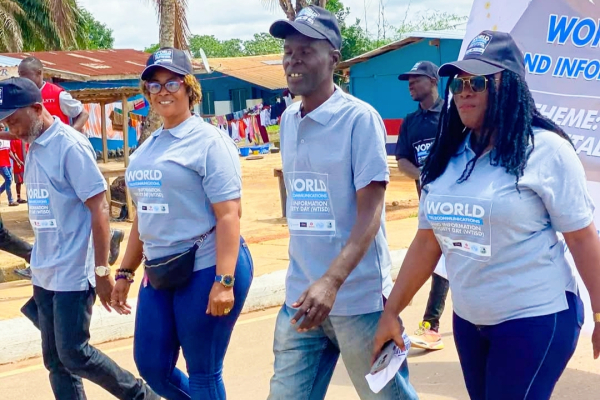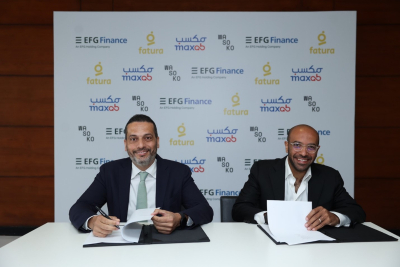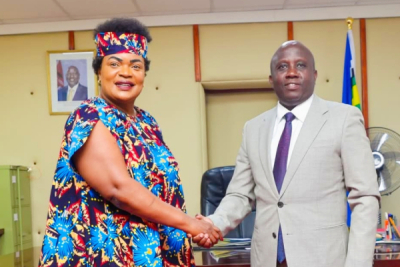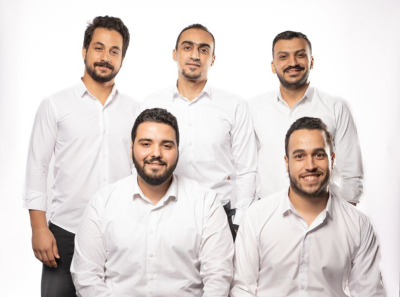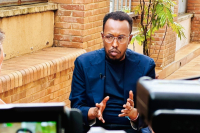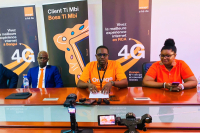- Liberia launched community Wi-Fi hotspots in Bong and Nimba counties with CSquared Africa.
- Initiative aims to expand affordable Internet in public spaces like schools and health centers.
The Liberian government has begun rolling out community Wi-Fi hotspots across the country in an effort to enhance Internet access for its citizens. The initiative, launched last week in Bong and Nimba counties, is a partnership with telecom infrastructure provider CSquared Africa and other stakeholders. Its unveiling coincided with celebrations for World Telecommunication and Information Society Day.
"With new low-cost WiFi access at health centers, schools, and community spaces, we are actively working to enhance digital literacy and economic participation in underserved communities. This initiative reflects our commitment to ensuring that every Liberian can benefit from and contribute to the digital transformation," Liberia's Ministry of Posts and Telecommunications said in a statement published on Facebook.
Internet penetration in Liberia stood at 23.5% in 2023 for an estimated population of 5.6 million, according to data from the International Telecommunication Union (ITU). The high cost of Internet services is considered one of the main barriers to adoption by the Global System for Mobile Communications Association (GSMA). The ITU estimates that in 2024, mobile Internet expenses accounted for 8.2% of monthly gross national income (GNI) per capita, significantly higher than the 2% threshold considered affordable by the organization. Fixed Internet costs were even more prohibitive, at 153% of GNI per capita.
While community Wi-Fi hotspots could accelerate Internet adoption in Liberia, their deployment is currently limited to specific areas. The government has not yet specified a timeline for expanding the initiative nationally or provided details on access terms, particularly regarding potential costs for users.
Beyond affordability, service cost is not the sole obstacle to Internet adoption. The GSMA also highlights the limited availability of Internet-compatible devices such as smartphones, tablets, or computers. According to the ITU, only 59% of Liberians owned a phone in 2023, without specifying the proportion of smartphones. Other barriers include a lack of digital skills, limited user experience, and concerns about online security.
By Isaac K. Kassouwi,
Editing by Sèna D. B. de Sodji
Driven by a powerful personal experience, she has chosen to take action, leveraging technology to better support women on their journey to motherhood. Her mission: to reimagine maternal healthcare across the continent and ensure that no woman is left behind.
Ifunanya Lilian Igweze, a Nigerian physician and tech entrepreneur, has launched Preggify, a healthtech startup aimed at supporting working women and young professionals through their maternity journey. Founded in 2022, Preggify seeks to help African women of reproductive age balance their health and careers by offering accessible, affordable, and user-friendly maternal health services. The platform provides personalized medical monitoring and tailored resources from preconception to postpartum.
The inspiration behind Preggify emerged from a deeply personal and painful experience for Igweze: the loss of her own pregnancy. "I think my most recent challenge was losing my pregnancy while working in the hospital. Although this was a devastating experience for me, but it also turned out to be a game-changer in my career. The pain of my loss made me to resign from my job, I had time to read books and meditate. It was at this point that Preggify was birthed to solve problems like this for other women," she shared.
Igweze earned her master’s degree in medicine and surgery in 2017 from Chukwuemeka Odumegwu Ojukwu University in Nigeria. Between 2019 and 2020, she worked as a front desk officer and assistant to the social welfare head at Nnamdi Azikiwe Teaching Hospital. In recognition of her dedication to maternal health, Igweze was honored with the Exceptional Woman Award in 2023.
By Melchior Koba,
Editing by Sèna D. B. de Sodji
MaxAB-Wasoko, Africa’s retail e-commerce and supply chain super app, announced, on May 19, the acquisition of Egypt-based B2B marketplace Fatura from EFG Finance, a subsidiary of EFG Holding. As part of the deal, EFG Finance becomes a significant shareholder in MaxAB-Wasoko and gains a seat on the company’s board.
MaxAB-Wasoko’s embedded financial services will extend credit access to its growing merchant base, enabling retailers to restock faster and grow sustainably. The acquisition also enhances operational efficiency, strengthens supplier networks, and positions the company for continued top-line growth over the next 12–18 months.
The move strengthens MaxAB-Wasoko’s ambition to unify the fragmented B2B commerce and fintech landscape across Africa.
• Kenya plans to establish a Regional Center of Competence focused on digital skills and AI.
• The center will back the Kenya Digital Master Plan 2022-2032, which aims to train 300,000 civil servants by 2030.
The Kenyan government is set to establish a Regional Center of Competence focused on advancing digital skills and artificial intelligence (AI), a move aimed at bolstering the capabilities of civil servants to enhance the quality of public services for the populace.
The initiative is backed by the United Nations Development Programme (UNDP) and will be affiliated with the Kenya School of Government, an institution dedicated to the ongoing professional development of public administration executives and civil servants. The center's launch was discussed last week during a meeting between John Tanui (photo, right), Principal Secretary for Digital Economy and ICT, and his counterpart responsible for Public Service and Human Capital Development, Jane Kere Imbunya (photo, left).
This undertaking aligns with the Kenyan government's broader digital transformation agenda, which seeks to harness digital technology for socio-economic progress. Cultivating the digital proficiency of civil servants stands as a key pillar of the "Kenya Digital Master Plan 2022-2032." The government has set an ambitious target to train 300,000 civil servants in digital services by 2030, representing 85% of public employees.
This approach finds support from the Organisation for Economic Co-operation and Development (OECD). In its report, "Developing skills for digital government: A review of good practices across OECD governments," the OECD emphasizes that to facilitate the transition to digital administration, nations must invest in developing the skills of their civil servants. This comes against the backdrop of a World Bank estimation that nearly 230 million jobs in sub-Saharan Africa will demand digital skills by the year 2030.
However, the specific timeline for the center's operationalization remains undetermined. Furthermore, the OECD cautions that the effectiveness of civil servant training will hinge on its design and implementation. The organization recommends that governments identify crucial digital skills, assess the existing competencies of public employees, address any gaps with customized training programs, and subsequently evaluate the impact to refine future initiatives.
By Isaac K. Kassouwi,
Editing by Sèna D. B. de Sodji
• Egypt is investing $59 billion to build a futuristic smart city 45 km east of Cairo as part of its Vision 2030 strategy.
• The city will feature AI, IoT, connected transport, automated public infrastructure, and intelligent surveillance
Egypt is channeling $59 billion into the development of a futuristic smart city, a flagship project under its Vision 2030 strategy. This high-tech megacity, currently under construction 45 kilometers (about 28 miles) east of Cairo, is intended to ease congestion in the capital and establish Egypt as a frontrunner in digital urban planning across Africa.
Conceived as a regional technology hub, the new administrative capital will integrate cutting-edge digital solutions, encompassing artificial intelligence (AI), the Internet of Things (IoT), automated management of public utilities, interconnected transportation networks, and intelligent surveillance systems. The initial phase, requiring an investment of $8.4 billion alone, is largely complete, exceeding 70% progress. Subsequent phases are projected to continue until 2027, with potential adjustments based on economic developments.
This ambitious megaproject aligns with a rapidly expanding global trend. Worldwide, the smart city market is experiencing significant growth. Valued at $1.36 trillion in 2024, it is forecast to reach $3.84 trillion by 2029, demonstrating an average annual growth rate of 23.21%, according to data from Mordor Intelligence.
While Africa currently constitutes a modest portion of this global market, the continent is progressively emerging as a significant player. Countries such as Egypt, Morocco, Rwanda, Nigeria, Kenya, and South Africa are prioritizing smart urban initiatives to tackle urban population growth, governance challenges, transportation issues, and sustainability imperatives.
In Egypt's case, this smart city is designed to accommodate 6.5 million residents. It will house key government functions, including headquarters and ministries, foreign embassies, and centers for digital innovation. Buildings throughout the city will be equipped with smart sensors to optimize energy and water consumption, enhance security, and manage mobility efficiently.
Despite criticism concerning investment priorities in a nation grappling with high inflation and increasing public debt, Egyptian authorities maintain a long-term perspective. They are banking on the project's potential to generate economic benefits, create skilled employment opportunities, and drive the digital transformation of government administration as catalysts for sustainable progress.
Samira Njoya
Egyptian cybersecurity startup THE WHITEGUARD has secured a six-figure pre-seed investment, led by Den VC, to scale its AI-driven, regulation-ready cybersecurity solutions across Egypt, the Middle East, and Africa (EMEA).
The funding reflects strong investor confidence in the startup’s vision of using intelligent, adaptable tools to address rising cyber threats and regulatory demands.
The funds will support product development, team growth, and market expansion, as THE WHITEGUARD positions itself to meet the region’s growing need for secure and compliant digital infrastructure.
At the head of an innovation center based in Mogadishu, he strives to build a robust technological ecosystem in Somalia. Balancing entrepreneurship and expertise in public policy, he embodies a new generation of change-makers.
Abdihakim Ainte (photo), a Somali-born tech entrepreneur, researcher, and analyst, is the co-founder and Chief Executive Officer of iRise Hub, a center dedicated to fostering innovation and technology.
Established in 2016 in Mogadishu, Somalia's capital, iRise Hub aims to cultivate a local ecosystem capable of attracting international investment. The center targets entrepreneurs, developers, investors, technicians, innovators, and the broader Somali startup ecosystem, providing them with a collaborative workspace to share ideas and advance their projects.
iRise Hub offers training in design thinking, a user-centered innovation methodology, and develops customized programs to facilitate startups' swift entry into the market. Currently, the iRise Hub community encompasses over 40,000 members and 80 mentors. The center has implemented more than 20 programs, organized over 350 events, and supported over 3,000 startups to date.
Prior to launching iRise Hub, Ainte founded TransLink Advisory in 2014, a consulting firm specializing in security, socio-economic development, and institutional strengthening.
Ainte holds a bachelor's degree in political science and government, earned in 2017 from Linnéuniversitetet, a Swedish university. He also holds a master's degree in public policy analysis from the University of Bristol in England, which he obtained in 2020.
His professional journey commenced in 2011 at the Institute for Peace and Security Studies (IPSS), where he served as a researcher focusing on issues related to Somalia. In 2014, he became the director of the Somali Forum for Progress, an independent think tank uniting researchers, intellectuals, academics, policymakers, and journalists to contribute to the country's development.
By Melchior Koba,
Editing by Sèna D. B. de Sodji
Communication barriers frequently limit deaf individuals' access to essential services. In Ghana, three tech entrepreneurs have introduced technological innovations to address this.
DeafCanTalk is a mobile application developed by a Ghanaian startup. It uses AI to facilitate real-time communication between deaf and hearing people. The startup was founded in 2021 by Ike Agyei Mensah, Bejal Joshi, and Victor Wealth-Adankai.
"In an inclusive classroom, for example, the deaf person needs an assistive tool to communicate and take notes while attending lectures. We leverage AI to convert the spoken words of the lecture into a recorded text that is saved for the deaf person, who can look at it later on to create proper notes, as well," explained Ike Agyei Mensah.
The application is currently available exclusively on the Android platform, where it has garnered over a hundred downloads according to the Play Store. DeafCanTalk incorporates a range of features, including note-taking capabilities, sign language courses, assistive communication technology, a dedicated customer support service called "Deaf-Care," telemedicine solutions, and inclusive employment programs. These features collectively aim to enhance the social inclusion of deaf individuals and those with speech disorders.
"We also use AI to generate QR codes that connect deaf and hard-of-hearing individuals to interpreters on the go and are currently working on a speech-to-sign language and sign language-to-speech model using AI," added Ike Agyei Mensah.
Since its launch, the startup reports a user base of 10,000 individuals across the African continent. By merging technology with a commitment to social impact, the application signifies a substantial stride towards a more inclusive society, where communication serves not as a barrier but as a connection between people.
Adoni Conrad Quenum
A visionary entrepreneur, she designs practical tools that connect African talent with relevant opportunities. Her work champions an Africa that leverages its own expertise for development.
Raodath Aminou (photo), a Beninese technology entrepreneur and strategy consultant specializing in private sector development, has launched Entourage, a startup established in 2024 to streamline access to African expertise.
This digital platform compiles a roster of specialists across diverse fields on the continent. It provides professionals and entrepreneurs with the opportunity to schedule private video consultations with their chosen experts, gaining personalized advice to accelerate their careers, expand their businesses, or enhance their skill sets.
"Whether you're part of the African diaspora seeking promising remote opportunities, or a professional based in Africa aiming to fast-track your growth, Entourage is here to furnish you with high-caliber expert guidance, a robust network, and the essential support to achieve your objectives with confidence," the company's website states.
Prior to founding Entourage, Aminou co-founded OptiMiam in 2014, an application designed to combat food waste by linking consumers and retailers to sell surplus products before they expired. She served as CEO of OptiMiam until 2017.
Her academic background includes a bachelor's degree in information systems management from the University of Dayton in the United States, earned in 2010. In 2011, she obtained an engineering degree in information systems management from the Institut Supérieur d'Électronique de Paris (ISEP). In 2014, she earned another engineering degree in innovation management and digital economy from the École Polytechnique in France.
Between 2017 and 2019, Aminou served as an ambassador for the French Tech Diversity program, an initiative focused on promoting social diversity within France's startup ecosystem. Concurrently, she held a position on the board of directors of the Invivo Foundation, an endowment fund dedicated to agricultural and food innovation. She also spearheaded entrepreneurship and innovation programs at Sèmè City, an innovation hub located in Benin.
Throughout her career, Aminou has garnered numerous accolades. In 2014, OptiMiam won the E-food competition organized by Vitagora and Premice, prominent players in France's agri-food innovation sector. She also received the Gold Palm of e-commerce, awarded by the Paris Chamber of Commerce and Industry. In 2015, she won the Digital Service Award as well as the Special Consumer Award at the Food Distribution Innovation Forum. Additionally, she was awarded the PEPITE Prize by the French Ministry of Research and Higher Education.
By Melchior Koba,
Editing by Sèna D. B. de Sodji
-
Orange Central Africa launched 4G mobile technology on May 15, following years of investment to modernize infrastructure and meet regulatory requirements.
-
The rollout aims to strengthen Orange's market position in a digitally underdeveloped but high-potential market, offering faster speeds for video calls, remote work, and online services.
-
The 4G network is expected to support digital transformation, benefiting SMEs, professionals, and startups, while fostering innovation in education, healthcare, and mobile finance.
Orange's Central African Republic subsidiary officially rolled out its fourth-generation (4G) mobile technology on Thursday, May 15, marking a significant step for the telecom operator as it aims to solidify its position in a market with substantial untapped digital potential.
"This launch is the culmination of several years of investments, encompassing technical, human, and regulatory efforts. It represents a major milestone for advancing digital technology in our cherished nation," stated Max Francisco, General Manager of Orange Central Africa.
Faced with increasing strain on its 3G network, the Central African arm of the French telecommunications group initiated a series of investments in 2021 to upgrade its infrastructure and meet regulatory requirements. The new 4G service is currently operational in Bangui, Bouar, Berbérati, and Bossangoa, with plans to extend coverage to Bambari in the coming months.
Offering speeds up to ten times faster than 3G, 4G provides an enhanced experience for activities such as video conferencing, remote work, online gaming, and cloud-based services. To facilitate this transition, Orange has also launched a complimentary migration campaign to 4G-compatible SIM cards and enhanced its data packages.
The introduction of 4G is part of a public-private partnership agreement signed in November 2024 between Orange and the Central African government, through the Ministry of Digital Economy. This agreement is designed to accelerate the deployment of high-speed internet coverage nationwide, supporting the country's broader digital transformation agenda.
Market Poised for Expansion
The Central African Republic's telecommunications market is currently shared among Orange, Moov Africa, and Telecel. According to DataReportal's 2024 figures, the country has 2.1 million mobile phone subscribers and 839,000 internet users within an estimated population of 5.4 million. With an internet penetration rate of 15.5%, the nation presents a significant opportunity for growth in digital services.
In this environment, Orange views the deployment of 4G as a strategic tool to broaden its service offerings, attract new customer segments such as small and medium-sized enterprises (SMEs), students, and professionals, and foster the growth of digital adoption in a country actively pursuing modernization.
Furthermore, 4G has the potential to stimulate the development of new services in sectors like education, healthcare, mobile finance, and e-governance. It also presents a valuable opportunity for young entrepreneurs and local start-ups to create digital solutions tailored to the specific needs of the country.
By Samira Njoya,
Editing by Sèna D. B. de Sodji
More...
-
Ghanaian Minister Samuel Nartey George and Indian Ambassador Shri Manish Gupta met to explore partnerships in digital payments, mobile banking, and financial inclusion.
-
Discussions also focused on developing Ghana as a coding hub in Africa and strengthening digital infrastructure to support innovation.
-
Talks are still in the early stages, with no formal agreements signed, but both parties expressed commitment to deepening collaboration.
The Ghanaian government intends to deepen its collaboration with India in the technology sector, a key topic during a meeting on Thursday between Ghana's Minister of Communication, Digital Technologies, and Innovation, Samuel Nartey George (photo, center), and India's Ambassador to Ghana, Shri Manish Gupta (photo, left).
During their discussions, both sides explored potential partnerships in areas such as digital payments, mobile banking, and financial inclusion. They also discussed the development of Ghana's tech ecosystem, with the aspiration of positioning the country as a coding hub in Africa. Finally, the talks centered on strengthening digital infrastructure to better support innovation and entrepreneurship.
This meeting is part of the Ghanaian government's broader international cooperation efforts aimed at digital transformation, which it views as a crucial driver for socioeconomic development. In recent weeks, Ghana has notably strengthened ties with Germany, Italy, Turkey, Israel, and Denmark. This is in addition to collaborations with entities and companies such as fiber optic firm CSquared, Deloitte, the African Regional Satellite Communication Organization (RASCOM), the United Nations Educational, Scientific and Cultural Organization (UNESCO), and Meta.
Currently, Ghana ranks 108th out of 193 countries on the United Nations e-Government Development Index, with a score of 0.6317. This is significantly higher than the African average of 0.4247 but slightly below the global average of 0.6382. India, in comparison, ranks 97th with a score of 0.6678.
Exchanges between Ghana and India are still in the initial stages. Both parties have committed to further exploring avenues for cooperation and identifying specific projects for implementation. However, no formal agreements have been signed or announced at this time, indicating that future developments will be necessary to provide more definitive insights into the prospects and potential impact of this collaboration.
By Isaac K. Kassouwi,
Editing by Sèna D. B. de Sodji
-
Gabon signed a strategic partnership with Visa to enhance financial inclusion.
-
The initiative includes distributing virtual bank cards to underserved populations, especially in rural and informal areas, and promoting electronic payments within public administration.
-
The collaboration aims to bridge the gap between Mobile Money usage and the lower banking rate by integrating digital financial solutions into public services.
Gabon's Ministry of Digital Economy, Digitalization, and Innovation announced Thursday a strategic partnership with Visa, the U.S. electronic payments firm, on the sidelines of the Africa CEO Forum 2025 in Abidjan. The initiative aims to strengthen financial inclusion through digital means.
The agreement notably includes the distribution of virtual bank cards targeted at populations currently underserved or inadequately served by traditional banking networks, particularly in rural and informal sectors. The partnership also seeks to accelerate the adoption of electronic payments within the public administration, with the goals of modernization, increased transparency, and improved efficiency of state services.
This collaboration aligns with the Gabonese authorities' ambition to democratize access to financial services through innovative and tailored digital solutions. According to the World Bank, Gabon's financial inclusion rate, including Mobile Money services, reached 66.09% in 2021. However, the overall banking rate, encompassing microfinance institutions, remained limited at 27.55% in 2021, compared to a reported 30% in 2024.
This partnership with Visa could help bridge this disparity by facilitating access to digital financial services for a wider segment of the population. By integrating digital payment solutions into public services and expanding access to modern financial tools, Gabon reaffirms its commitment to modernizing its economy and fostering more inclusive growth.
By Samira Njoya,
Editing by Sèna D. B. de Sodji
Access to accurate, timely, and actionable market data is critical for making sound investment decisions. Innovations like Data Direct are critical to deepening market participation, improving investor confidence, and aligning the ZSE with global best practices in capital market infrastructure.
The Zimbabwe Stock Exchange Limited (ZSE) has launched Data Direct, an Artificial Intelligence (AI)-enabled market data platform designed to transform how investors access and engage with financial market information. The platform, announced May 14 in a release by ZSE, is aimed at improving transparency, accessibility, and decision-making for stakeholders across Zimbabwe’s capital markets.
The launch of Data Direct is part of our digital transformation strategy to ensure our stakeholders have easy access to market data, said ZSE in the release.
Data Direct combines cutting-edge AI technology with a user-friendly interface to provide investors with real-time access to comprehensive market data from both the Zimbabwe Stock Exchange (ZSE) and the Victoria Falls Stock Exchange (VFEX). The platform offers a suite of features, including end-of-day reports, historical data, and viewing rights to live trading via a View-Only Terminal (VOT).
According to the ZSE, the introduction of AI-generated insights on the platform is a game-changer for investors. The advanced AI capabilities enable precise, timely, and actionable market analysis, giving users a competitive edge by going beyond conventional reporting and data interpretation. This empowers traders, analysts, and institutions to make more informed investment decisions based on predictive trends and tailored insights.
Following a successful soft launch in April 2025, which garnered positive feedback from early users, the ZSE refined the platform to enhance its functionality and user experience. The platform is available through a dedicated web portal and is connected to Paynow, allowing for seamless payment and subscription using a variety of channels.
Transparency and timely access to data are crucial for building trust in any financial system. One of the longstanding challenges in African capital markets is the perception of low transparency and limited access to quality data. Tools like Data Direct are vital in reversing that narrative. By providing customizable data, historical records, and live market views, the platform promotes greater accountability, trust, and evidence-based decision-making.
The move aligns with ZSE’s digital transformation strategy to enhance market accessibility and efficiency.
Hikmatu Bilali
-
Huawei introduced digital solutions to tackle exploration inefficiency, pipeline security issues, and reliance on foreign data systems.
-
Key innovations include an AI-based offshore exploration tool and 3D security platform.
Chinese technology firm Huawei has launched a suite of digital solutions aimed at bolstering the transformation of Nigeria's oil and gas sector. The announcement occurred in Lagos during the Oil and Gas Forum, a key event at Huawei Nigeria Day 2025, held last week.
These technological offerings are designed to tackle three significant challenges hindering the industry's efficiency: cumbersome exploration processes, persistent vulnerabilities in pipeline security, and a reliance on foreign systems for data management, which compromises digital sovereignty.
Among the showcased innovations is an artificial intelligence (AI)-driven offshore exploration solution. This technology promises to slash seismic data processing time from 21 days to a mere 72 hours, while achieving an impressive 92% accuracy rate. Pilot testing in the OML 130 block of the Niger Delta reportedly resulted in a 35% reduction in exploration costs. Huawei also presented a sophisticated three-dimensional security platform integrating fiber optic sensors and video analytics. This solution has purportedly reduced pipeline leaks by 60% and dramatically cut incident response time from 45 minutes to just 8 minutes.
Addressing the critical issue of digital sovereignty, Huawei introduced a localized cloud infrastructure that adheres to Nigerian regulations concerning strategic data. Information pertaining to oil and gas operations will now be stored within Nigeria, enhancing security and ensuring real-time accessibility.
This initiative aligns with Nigeria’s broader 2050 energy transition strategy, which seeks to strengthen domestic technical capabilities, ensure energy security, and modernize a vital sector of the national economy.
Oil and Gas: A Cornerstone of Nigeria's Economy
The oil and gas sector forms the bedrock of Nigeria's economy, generating over 90% of the nation's export revenue and approximately half of the government's income. As Africa's leading crude oil producer, Nigeria also holds the continent's largest proven natural gas reserves.
However, the sector grapples with long-standing structural challenges, including outdated infrastructure, insufficient investment in innovation, pipeline sabotage, and a dependency on foreign technology. By providing advanced technological solutions, Huawei aims to contribute to a more efficient utilization of national resources and improved governance within the sector.
To further this goal, the Chinese conglomerate intends to double incentives for its local partners and train more than 1,000 Nigerian professionals in energy technologies by the end of 2025. The objective is to cultivate a local ecosystem capable of accelerating the digital transition of Nigeria’s energy industry.
For Huawei, this strategic move aims to position Nigeria as a regional hub for energy innovation, leveraging technology to optimize productivity, secure critical infrastructure, and bolster data sovereignty.
By Samira Njoya,
Editing by Sèna D. B. de Sodji


